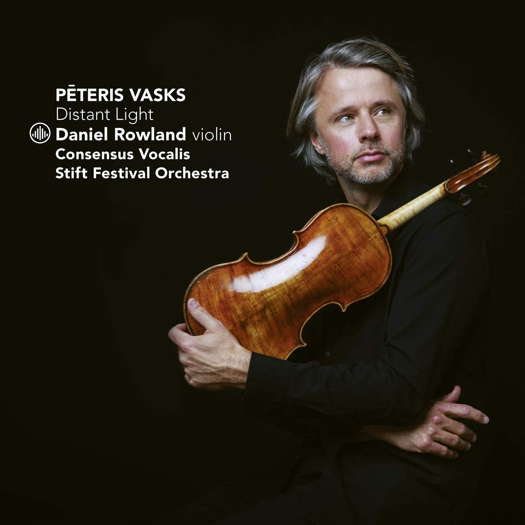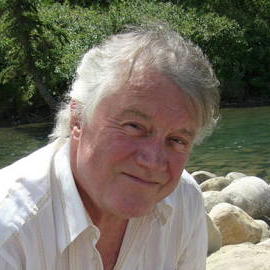- Sir Charles Hubert Hastings Parry
- double bass
- Roussel
- black composer
- Solo Musica GmbH
- Jean-Claude Risset
- Frank Sinatra
- Victoria BC

Living in the Moment
PAUL SARCICH explores the music of Pēteris Vasks
'... wonderfully luminous recordings of luminous music.'
Pēteris Vasks is a composer I have hitherto skipped around a bit, hearing odd snippets rather than full scale works, so this disc represents a first opportunity to get to grips with his work. Sometimes labelled a 'Holy Minimalist' alongside Eastern Europeans such as Pärt and Gorecki, and the likes of John Tavener, Vasks shows connections with them but as many important differences. Although he is quoted in the booklet notes as saying 'My intention is to provide food for the soul' and lamenting that the spiritual dimension has been lost from modern life, the notes also make clear that he has concerns with nature, the Latvian landscape and folklore (including folk music), the suffering of the Latvian people and a lot of personal biography. Spirituality there is in his works, but no overt religiosity: in this respect he might remind some of Vaughan Williams, a non-doctrinaire composer of many sacred works and often labelled 'mystical', but again, there are more differences than similarities.
The disc is also a showpiece for violinist Daniel Rowland, a former leader of the Brodsky Quartet and experienced soloist, as all works bar one feature virtuosic solo violin parts. Vasks has swung towards a lot of string solo and string orchestral writing in recent years, and Rowlands invited him to be Composer in Residence at the 2019 Stift Festival in Holland. These live recordings were made then, but have very little ambient or audience noise to disrupt them.
The headlining piece on the disc, Distant Light, is a violin concerto in one movement but eight distinct parts: two Andantes, two Cantabiles, three cadenzas and a Mosso. Opening with high harmonics it sets an otherworldly atmosphere with the miking so close we hear instrument noise as well. Slow moving music which at first doesn't grab the ear, coalesces into a more conventionally tonal prayer-like section. The first cadenza is far more impassioned, giving way to brooding low strings divisi, with richly romantic low range solo violin, before the pitch level rises and we have a beautiful meditative section – not however, something that sticks easily in the memory. The Mosso section is obviously influenced by Latvian folk dance, the second cadenza also animated and continuing the mood of the Mosso.
Listen — Vasks: Mosso (Distant Light)
(track 4, 0:15-0:44) ℗ 2020 Challenge Classics :
The second Cantabile is more melancholic than the first, but not at all gloomy, as Vasks cannot resist building climaxes of intense, rich chords in the orchestra with a soaring soloist. This high romanticism gives way to something more modernistic, before the third cadenza outdoes the other two in wild virtuosity, leading to aleatoric chaos only ended by a bizarre waltz in the bass. The final Andante returns us to the opening mood, building more impassioned climaxes before fading into quietude and the soloist ascends to the stratosphere.
Listen — Vasks: Andante II (Distant Light)
(track 8, 2:24-3:11) ℗ 2020 Challenge Classics :
This piece sets the tone for the whole album, not only in terms of Vasks' personal language but also of the commitment to the music shown by Rowland and his orchestra. Rowland has a sure-footedness and the sort of dazzling sound the piece needs. It does not rely on the extended techniques of so much contemporary music but a thorough command of traditional techniques, pushed to a very high level. Rowland and his forces deliver.
Musically, it explores a considerable emotional journey from the meditative to the chaotic and everything in between. What it is definitely not is minimalism, in the sense that we would understand from composers usually affixed with that label: there are too many wandering ideas, too many changes of texture, style, activity levels, all bound up in a more-or-less free tonal language. It is Vasks' own brand of romantic modernism.
The other pieces on the disc share many of the already mentioned characteristics. Lonely Angel is both a meditation and a violin concerto, the soloist cast as the angel, soaring over the orchestra with concern and hope. Perhaps putting one in mind of Tavener's The Protecting Veil in form, but very different in content. The first section has the soaring violin, the bass end following their own melodic arc, and the middle voices doing ostinato passages, the nearest thing to minimalism perhaps, but also what one finds in the middle string parts of classical works. The roles are reversed as the orchestra takes the meditation while the soloist decorates with nervous arpeggiated work. This structure is repeated, before the string sounds move ever upwards, again disappearing into the upper atmosphere – another little Vasks trademark it seems. The tempo is uniformly slow throughout, but within that there is lots of activity, and little obvious repetition. One could take a sound-bath in this piece.
Listen — Vasks: Lonely Angel
(track 9, 0:02-0:51) ℗ 2020 Challenge Classics :
Plainscapes brings in the Consensus Vocalis choir, directed by Benjamin Goodson, the only strings are Rowland and his partner Maja Bogdanovic on cello. This is the overt nature piece, Vasks ruminating on the flat Latvian landscape and what it means to him. Three vocalises are separated by short string interludes, using many of the tropes we have already heard - harmonics, glissandi etc - but this music is more diatonic and meditative. Some of the motoric rhythms could be considered Pärt-ish, and even in a piece about flat landscape Vasks cannot resist the climb to the blazing climax, after which we get a chorus of birdsongs, the choir whistling and tweeting themselves crazy – how they must have loved doing that bit! – before another climactic rise and fall back to the opening meditation, before again ascending to the heavens.
Listen — Vasks: Plainscapes
(track 10, 10:05-10:58) ℗ 2020 Challenge Classics :
Dona Nobis Pacem is also meditative, the choir getting to sing only those three words over and over; its narrowly compassed melodic lines, diatonic and modal writing - here's the reminder of Vaughan Williams - and absence of intricate polyphony producing a foundation of chant-like properties and sombre mood overall, even though we do get the inevitable glowing climax. When the big tune arrives at around eight minutes in, it is a simple, hymn-like one which doesn't hang around too long but meanders off into continuous development, as so many of Vasks' lines do. Another sound-bath piece, it would go down well late at night.
So in summary, all these pieces show much emotion, much raising and lowering of temperature, much contrast and textural change, great differences in activity levels, and yet there is a lot that stays the same. If Vasks is intending us to live in the moment, and not take away anything that will lodge in the memory or soul forever, he is succeeding. For those who wish to get meditative with music that has real substance, and not with just some anodyne collections of repetitive chords or recordings of waterfalls, this will indeed provide food for not just the soul, but the mind and heart as well. I get what Vasks is about, and it is now easy to hear his signatures and personality in the music, I just doubt that I will remember much of the music itself.
Which probably means I shall have to keep returning to it – no great problem when the playing and recording are as fine as this. The technical side is credited to Floren Van Stichel and Cédric Murrat, who have produced wonderfully luminous recordings of luminous music. Excellent booklet notes complete a fine package.
Copyright © 13 February 2021
Paul Sarcich,
London UK

CD INFORMATION - PĒTERIS VASKS: DISTANT LIGHT - DANIEL ROWLAND
MORE CLASSICAL MUSIC ARTICLES ABOUT LATVIA




